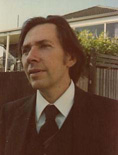Tom Howard/John H. Reid Short Story Contest 2012
Congratulations to the winners of the 2012 Tom Howard/John H. Reid Short Story Contest!

First Prize $3,000
Tony Myres, Searching for Father—A Tale of Repentance, Redemption and Resurrection
Most Highly Commended $150
- Erin Byrne, The Healing Heights of Machu Picchu and Dear Madame Renaud
- Luke Melia, The Skedaddler
- Rajdeep Paulus, The Color of Tomorrow
- Kelcey Stivers, Under the Surface
- Randy Zumalt, No Socks
This year's submissions for the Prose Contest were easily the best ever received. In fact, the judges ended up with well over one hundred entries on the potential prize-winning list. After fruitlessly endeavouring to pare this list down to a more manageable level, the judges decided on a different approach, namely to judge the entries purely on their emotional appeal. After all, why do most people read stories? To marvel at their precise use of English, or the clever way in which adjectives are employed, or even the sparkling brilliance of their clever dialogue exchanges?
So for the fifth time, the judges read all the entries again but on this occasion we were not seeking to evaluate the writing itself, but the author's ability to make his or her subject matter come across to the reader with the utmost in power and emotional appeal.
On this yardstick, Tony Myres' totally amazing, highly emotional "Searching for Father" was easily the outright winner.
Tony had brilliantly handed us a story that made us cry with joy, so I guess it was inevitable that our second choice would fall on an entry that made us laugh so heartily that we all but fell off our chairs: "The Neighborhood Pig", brilliantly written by Bonnie McCune!
Our third choice, "Stranger in the Snow", very cleverly constructed by Tom Alberti, is what is known in the trade as a "Saturday Review" story. You don't see many of these tales in writing contests, but I've always had a soft spot for the "Saturday Review" prescription. Basically it's a story with a double-threaded plot in which the two threads neatly come together for a satisfying conclusion. These stories sound easy to write, but they're actually very difficult. It's a rule of the genre that not only must the threads join for that neat conclusion, but there must be no superfluous words, scenes or action along the way. Also, the fact that you're writing a "Saturday Review" entry needs to be artfully disguised, otherwise the reader will jump to the conclusion before you do! "Stranger in the Snow" is a perfect example of "Saturday Review" writing at its best.
"Letter to Sylvia" by Rita Myres also serves as an engrossing example of a once-popular form that has been brilliantly brought to a new and highly satisfying life.
For the first time ever, a contestant has won two awards in the Most Highly Commended category. It was a surprise to the judges, because the two stories are quite different in both subject and style. In fact, the only aspect that both "Dear Madame Renaud" and "The Healing Heights of Machu Picchu" have in common, is the highly charged emotional impact they have on the reader. Congratulations, Erin Byrne!
"No Socks" by Randy Zumalt is a perfect example of the short-short story. Most people regard a short-short as a story that runs for a thousand words or less. This is true, but there is much more to writing a short-short than mere length. For one thing, it seems obvious to me that every word must count and, if possible, have a double or triple function. In fact, an economy of words should be matched by an abundance of double functions. Dialogue, for example, should not only carry the plot forward but be in character with the speaker. It should also be amusing or entertaining or suspenseful in itself. There also has to be a sense of urgency about the tale. Here, the writer has taken a clever idea and amusingly developed it into a nicely rounded but realistic little story that engages the reader's interest right from the start and comes to a satisfyingly piquant conclusion. Many writers obviously regard the short short form as a longwinded joke that comes to an emphatic punchline. But, as the winning writer here demonstrates, a short-short doesn't have to terminate with a knockout punch. To a large extent, it can be left up in the air, and the narrator's fate can be adroitly implied rather than actually set down in black and white.
"The Color of Tomorrow" is an engaging, ethnic story that takes us to India and two young girls who decide to better their lives by applying for jobs in the US. To grab the average American reader's interest in what would be regarded as a foreign story, it's necessary to emphasize not only how similar are the emotions and aspirations of the main characters, but how dissimilar as well. In other words, the writer is not only required to keep a precarious balance between the two worlds, but yet at the same time keep the reader's sympathy emphatically centered on the principal characters. This is a hard task in any language, but Rajdeep Paulus rises to the task magnificently, partly by using a first-person narrator to take us to the heart of her emotions, partly by the novelty yet believability of the plot with its remarkably credible observations, and partly by the sheer skill of her selectivity. The author steers an adroit path between giving the reader too much information to absorb or not enough. It's a balancing act that she brings off perfectly.
It's rare to receive an historic tale in our competition, and the few that do land on our desk are usually high in ambition but extremely low in credibility. Luke Melia has broken the pattern with a really out-of-the-box story that is both highly engaging yet highly credible. I won't spoil your enjoyment by telling you who the principal character is. But he's a most agreeable surprise and the whole tale is written and told with a really brilliant flair that in any other contest than this one—which is absolutely overloaded with superbly written entries—would win First Prize!
Finally—although not in order of importance (I dislike listing winners alphabetically, so I simply drew straws)—is a remarkably mature entry from schoolgirl Kelcey Stivers, who writes with a seasoned skill that belies her young years and gives us an earnest of talent that would sit perfectly with a seasoned writer two or three times her age. I must mention that the judges give no consideration to the age of the contestant. All entries are judged on a level playing field. Occasionally, we have awarded prizes in our poetry contest to meritorious entries from schoolboys and schoolgirls, but this is the first occasion in which a prose entry from a contestant under the age of 18 has been awarded a cash prize. Congratulations, Kelcey!
Contest Judges

John Reid
John Howard Reid, founder of the Tom Howard/John H. Reid Fiction & Essay Contest and the Tom Howard/Margaret Reid Poetry Contest, won first prizes and other awards in prestigious literary events. A former journalist and magazine editor, he published several historical novels, a collection of poetry, a guide to winning literary contests, and over fifty books of film criticism and movie history. See his work at Lulu. He lived in Wyong, Australia, and passed away in 2018.
Contest Judges
Dee C. Konrad
A leading educator and published author, Mrs. Dee Konrad was Associate Professor in the English faculty of Barat College of DePaul University, and served as Dean of Liberal Arts and Sciences for the year 2000-2001.










